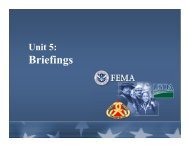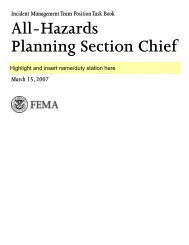EMI Course Catalog - Emergency Management Institute - Federal ...
EMI Course Catalog - Emergency Management Institute - Federal ...
EMI Course Catalog - Emergency Management Institute - Federal ...
Create successful ePaper yourself
Turn your PDF publications into a flip-book with our unique Google optimized e-Paper software.
STATE/LOCAL/TRIBAL FIELD<br />
COURSES—PREPAREDNESS<br />
EmErgEncy managEmEnt InstItutE • 2011-2012 • catalog of coursEs<br />
G310.5 Weapons of Mass Destruction: Biological-<br />
Anthrax Scenario<br />
G310.6 Weapons of Mass Destruction: Suicide Bomber<br />
Scenario<br />
Selection Criteria: The following is a list of recommended<br />
participants, but it is not all-inclusive.<br />
Core Recommended Audience: Chief elected/appointed<br />
officials; fire chiefs; sheriffs; police chiefs; directors,<br />
emergency services; directors, public works; directors,<br />
public health and safety; public information officers;<br />
chief financial officers; legal counsel; chief medical<br />
examiner/coroners; and communications directors.<br />
Other Possible Participants: transportation authority<br />
(port authority, airport authority, and/or area transportation<br />
authority, etc.*); evacuation coordinators;*<br />
mass care coordinators;* resource managers; chiefs,<br />
animal care and control agency; warning coordinators;<br />
coordinator of volunteer organizations;<br />
directors, emergency medical service (EMS); directors,<br />
hazardous materials team (HMT);* State and/<br />
or <strong>Federal</strong> representatives, as appropriate;* area<br />
military representative;* National Guard representatives;<br />
Department of Energy (DOE) representatives;<br />
<strong>Federal</strong> Bureau of Investigation (FBI) representatives;*<br />
Centers for Disease Control and Prevention<br />
(CDC) representatives; Environmental Protection<br />
Agency (EPA) representatives; U.S. Coast Guard<br />
(USCG) representatives; and representatives of<br />
neighboring jurisdictions.<br />
* The target audience with an asterisk must be invited (if they are<br />
available).<br />
Prerequisites:<br />
Required: The course is designed with the following<br />
assumptions about participation:<br />
1. The city or county conducting the course<br />
has an <strong>Emergency</strong> Operations Plan (EOP)<br />
and Standard Operating Procedures (SOPs).<br />
2. The participants know and understand<br />
their roles and responsibilities, as defined<br />
by their EOP; are trained in their areas of<br />
expertise; and know their jurisdiction.<br />
FEdErAL EmErgENCy mANAgEmENT AgENCy 98<br />
Fundamentals <strong>Course</strong> for Radiological<br />
Response (G320)<br />
This 3-day performance-based (hands-on) course<br />
for State and local radiological response team<br />
members covers the concepts of radiation protection,<br />
radiation detection instruments, radiological<br />
monitoring techniques, radiological hazards and<br />
protective actions, team-building, and basic procedures<br />
to support planning/response for emergency<br />
and recovery activities in the event of a radiological<br />
incident. The course covers all types of radiological<br />
hazards from fixed facility to transportation to<br />
WMD. This course is designed so that modules may<br />
be conducted separately and adapted to specific<br />
audience needs and requirements.<br />
Selection Criteria: State and local government radiological<br />
response teams and newly assigned hazardous<br />
materials response team members.<br />
Prerequisites:<br />
Required: IS-3, Radiological <strong>Emergency</strong> <strong>Management</strong>,<br />
or IS-302, Modular <strong>Emergency</strong> Radiological Response<br />
Transportation Training (MERRTT).<br />
Who’s in Charge Here?: Exercising<br />
Leadership in an <strong>Emergency</strong> or Disaster<br />
(G351)<br />
The purpose of this 6-hour course is to prepare local<br />
elected government officials to lead and direct their<br />
jurisdiction in implementing comprehensive emergency<br />
management systems.<br />
At the conclusion of the course, participants will be<br />
able to:<br />
• Exercise greater leadership in an emergency<br />
through a better understanding of their roles and<br />
responsibilities;<br />
• Develop emergency management policies and<br />
procedures for emergency management activities<br />
and implement necessary policies and procedures<br />
to respond to and recover from a disaster;<br />
• Initiate appropriate emergency management<br />
actions during a disaster;

















